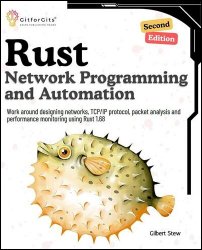 Название
Название: Rust for Network Programming and Automation, Second Edition: Work around designing networks, TCP/IP protocol, packet analysis and performance monitoring using Rust 1.68
Автор: Gilbert Stew
Издательство: GitforGits
Год: 2024
Страниц: 391
Язык: английский
Формат: pdf, azw3, epub, mobi
Размер: 10.1 MB
Designed with the needs of those interested in network programming and automation in mind, this updated "Rust for Network Programming and Automation" explores the realism of network programming within the robust Rust ecosystem. Building on top of Rust 1.68, this book takes you step-by-step through the essentials of network protocols, packet analysis, and network administration with up-to-date and thorough material.
Starting with the fundamentals of TCP/IP, you will be introduced to the core principles of network communication, such as data packet structure and transmission. The book then moves on to cover important topics like IP addressing, subnetting, and gateway configuration, ensuring a thorough understanding of network fundamentals. The chapters focus on the practical aspects of network programming, particularly the use of popular Rust libraries such as Tokio, Mio, and Rust-async for asynchronous network programming. These libraries are thoroughly examined, demonstrating how to create TCP listeners, bind sockets, and handle incoming connections efficiently.
Packet manipulation and analysis are also important topics, with practical examples using libraries like pnet and libtins. You will learn how to capture, process, and analyze network packets to gain an understanding of network traffic and identify potential problems. The book also focuses on network and performance monitoring, showing you how to set up and use various tools to track network availability, utilization, latency, packet loss, and jitter. Understanding these metrics allows you to ensure optimal network performance and reliability. Cloud network configuration, VPN setup, and data center networking are thoroughly covered, providing the necessary knowledge to manage and automate complex network environments.
Each chapter is intended to build on the previous one, resulting in a coherent and comprehensive learning experience. With clear explanations, practical examples, and up-to-date content, "Rust for Network Programming and Automation" provides you with the skills you need to get started in network programming and automation with the most recent Rust release. Anyone looking to learn Rust for network-centric applications can use this book, as it covers the basics as well as advanced topics.
Key Learnings:
Become fluent in the fundamentals of Rust-based TCP/IP programming.
Use the pnet and libtins libraries to capture and analyze packets in depth.
Use the Rust-async, Tokio, and Mio libraries to program asynchronous networks efficiently.
Be well-versed in IP addressing, subnetting, and configuring gateways to assure a secure network installation.
Learn to use Rust and OpenVPN to set up VPN connections.
Get skilled in monitoring network availability, latency, and packet loss.
Optimize network performance and uptime by automating routine tasks and configurations.
Apply sophisticated Rust methods to the configuration and management of data center networks.
Utilize AWS and rusoto to establish and oversee VPCs.
Use packet analysis and monitoring to improve network security by identifying threats.
Contents:
Basics of Network Automation
Essentials of Linux for Networks
Rust Basics for Networks
Core Rust for Networks
Rust Commands for Networks
Programming & Designing Networks
Establishing & Managing Network Protocols
Packet & Network Analysis
Network Performance Monitoring
Скачать Rust for Network Programming and Automation, Second Edition: Work around designing networks, TCP/IP protocol
[related-news]
[/related-news]